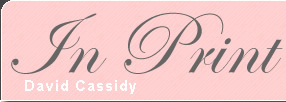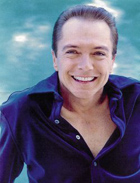
David Cassidy on the Web
Coming down with '70s Fever'
Lou Reda Productions takes look at what made decade unique.
Sunday, December 07, 2008
By John A. Zukowski
The Express-Times
http://www.lehighvalleylive.com
In the 1970s, Dominic Nicolosi's nights sometimes started at midnight. After working all day at Nicolosi's Pizza in Phillipsburg, he'd dutifully lock up the store at midnight.
Then he'd head toward Manhattan to Studio 54, the New York City disco open in the late 1970s that was a mecca for trendsetters -- and was notorious for its decadence and, yeah, the dancing, too.
Nicolosi would boogie at Studio 54 all night. Then he'd drive back to Phillipsburg in time to open up the pizza parlor early in the morning.
He'd somehow make his way through the day then finally crash into a deep sleep later that night -- more than 24 hours after his trip to Studio 54 started.
So how did Nicolosi even get inside Studio 54?
The club was infamous for the doormen who scrutinized wannabe club-goers. They wouldn't let anyone in who they thought didn't look hip enough. Desperate partiers tried to bribe them with money and drugs. And the doormen were even known to turn away celebrities.
But Nicolosi found a solution to get inside the disco fortress.
"The shoes," he says. "They'd always look at your shoes."
He bought his shoes at a long-gone local store. And they were vintage 1970s shoes -- tricked out and steep.
"If you ever tripped on the curb, you'd snap an ankle," he says, laughing.
So he was able to get past the doormen. He recalls spotting celebrities like Rod Stewart and Bianca Jagger inside. And he remembers it was a time of nightclub culture epitomized in the movie "Saturday Night Fever." It was an era of dining and dancing in style.
"One thing for sure about that time is that people knew how to dress," he says.
'70s film salute
Nicolosi is one of the featured interviews in Easton filmmaker Lou Reda Productions' new two-hour documentary, "70s Fever," which premieres at 8 tonight on the History Channel. It will be rebroadcast 8 p.m. Dec. 13.
The show is an entertaining grab bag of important events from the 1970s. It skillfully blends pop culture and politics and is narrated by former "Partridge Family" singer David Cassidy.
There are many trendsetting stories in the show: the publication of the Pentagon Papers, the Jonestown Massacre, the unexpected mainstream success of the X-rated movie "Deep Throat," the boxer who went up against Muhammad Ali and inspired Sylvester Stallone to write the movie "Rocky," and a huge "Disco Sucks" rally at Chicago's Comiskey Park, where disco records were blown up at a rally so raucous a White Sox game was forfeited.
Partying in tough times
To watch "70s Fever" is to realize there was a connection in that decade between a sagging economy and an excessive lifestyle littered with drugs, hedonistic nightlife and disco.
"People seemed to need an outlet," producer Liz Reph says. "People needed a way to let go of their troubles."
And there were many troubles in the 1970s.
As "70s Fever" shows, they included students being shot at an anti-war demonstration at Kent State University, the resignation of a president, the collapse of Vietnam and a paralyzing gas crisis and oil embargo that at one point had people getting gas by license plates that ended in either odd or even numbers.
History repeats itself
What struck the filmmakers were some similarities between then and now.
"There was the economy, a gas crisis, gay rights and even Barack Obama being voted in on a platform of hope like Jimmy Carter was," executive producer Scott Reda points out.
The show cuts between archival footage and stories from celebrities, including Richard Dreyfuss, Randy Jones (the cowboy from the Village People) and fitness guru Richard Simmons ("The 1970s said it was OK to have an afro and be a white man!" he declares).
In combing through history books and archival footage, the filmmakers found so many fascinating stories from the 1970s, they hope they can do a series of shows about the decade.
"One of the hardest things we had to do was decide what stories to include," Reph says. "We must have said 1,000 times how much this would make a great series."
"70s Fever" is a sequel to Reda's successful "Hippies" documentary, which aired about the hippie movement of the 1960s. But the 1970s had a different tone from the 1960s, Reda says.
"It was the 1960s without the optimism. By the end of the 1960s, people began to realize that a lot of the stuff that people were fighting for didn't come to fruition. So they decided to start indulging themselves."
And in "70s Fever" that indulgence may have no better symbol that the disco palace called Studio 54, which is used as a framing device to begin and end the show.
"It was the epitome of the self-indulgence of the 1970s and all its excesses," Reda says. "It was right if it felt good, and if it was outrageous, you did it."
